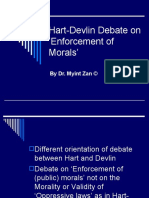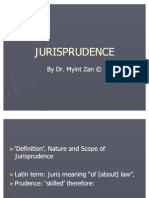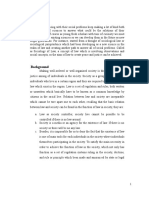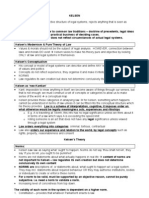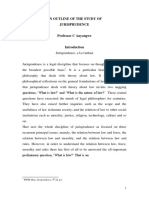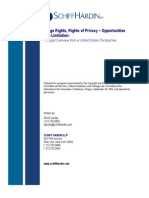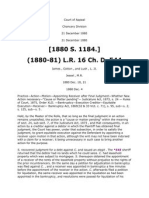Morality and The Criminal Law
Morality and The Criminal Law
Uploaded by
LegalLightCopyright:
Available Formats
Morality and The Criminal Law
Morality and The Criminal Law
Uploaded by
LegalLightOriginal Title
Copyright
Available Formats
Share this document
Did you find this document useful?
Is this content inappropriate?
Copyright:
Available Formats
Morality and The Criminal Law
Morality and The Criminal Law
Uploaded by
LegalLightCopyright:
Available Formats
Morality and the Criminal Law
Question: "Unless a deliberate attempt is made by society, acting through the agency of law, to equate the sphere of crime with the sphere of sin, there must remain a realm of private morality and immorality which is, in brief and crude terms, not the law's business." Discuss. The nexus between morality and law or, more specifically, the influence of morality on law has been the source of fertile debate among academicians, jurisprudential scholars and philosophers since the 18th century. The disputation reached its crescendo in the middle of the 20th century with the publication of the Wolfenden Report (from which the above quote is extracted),1 and initiated the famous Hart/Devlin debate in which Professor H.L.A. Hart and Lord Devlin debated on the role morality should play in the creation and application of criminal laws. This paper will discuss the quote in the wider context of that debate; however, before doing so, it is necessary to parse its essential components. Appropriately, the papers point of departure begins with asking the question, what is a law? A law may be defined as a binding rule of conduct, usually prescribed by judicial opinion or a statute, the breach of which results in sanctions being applied. Laws may be civil or criminal in nature: in criminal law cases are brought by the state against individuals or a body corporate while, conversely, in civil matters the case is brought by a citizen or body against another party. David Ormerod defines a crime as an act which has a particularly harmful effect on the public and does more than interfere with merely private rights; it is seen as an act which is morally wrong, a view which stems from the traditional attitude of the common law [that] crimes are essentially immoral acts deserving of punishment.2 This definition provides an appropriate segue into the meaning of morality which, admittedly, is notoriously difficult to define. It is necessary to establish, from the outset, that morality is not necessarily synonymous with religion and it is not the intention of this paper to embark upon a philosophical discourse to find its meaning.3 Rather, within the context of this essay, its meaning will be confined to the interpretations ascribed to it by natural law and utilitarian theorists since, as will be seen, the opposing views in the Hart/Devlin debate fit appropriately within these two schools of thought. Philosophers who adhere to natural law view postulate that laws and morality are intertwined; there is no clear distinction between the two and the law should reflect the moral universe of society.4 In Judeo-Christian societies, for example, the main function of the law was to codify moral values and, in this vein, it can be said that the criminalization of murder, adultery and theft owe their origins to the Decalogue. For the utilitarian philosopher, like John Stuart Mill, the harm principle and not morality should influence the creation of criminal laws. The law should only legislate against such behaviour which will cause harm to persons other than the agent.5 Thus, in Mills view, there is no
The 1957 Report recommended that, save for a few exceptions, homosexual acts between adult males in private should be decriminalized. On the matter of the rising trend of prostitution (which it attributed to a decline in family values), while it warned against criminalizing women for being prostitutes, it did recommend a legal gradation (based on repeat offences) in its scales of punishment for women convicted of working as prostitutes. 2 David Ormerod, Smith and Hogan Criminal Law (12th edition Oxford University Press, Oxford 2008) pp. 1012. 3 Some, societies still continue to equate crime with morality: in Islamic societies, for example, a study of the law is essentially a study of the Quran. 4 Which is the view disapproved of by the Wolfenden Report. 5 Concise Routledge Encyclopedia of Philosophy (Routledge, London, 2000) p. 464.
1
Morality and the Criminal Law
justification for the enforcement of sexual morality if the actions of the individual do not encroach on the rights of the society or even if such acts harm the individual himself. Private immorality, as Lord Devlin noted, is immorality which is not offensive or injurious to the public. 6 Adultery is a notable example of private immorality. Having distilled the relevant concepts of the quotation to their natural elements, this paper will now critically examine the Hart/Devlin debate to determine what role, if any, morality should play in influencing and enforcing criminal laws. Lord Devlins views (influenced as they were by natural law) that private morality and immorality ought to be the laws business can be supported on three grounds. The first argument is that the court is the custos morum (guardian of morals) against those offences which are contra bonos mores (against good morals) to society, as noted some 250 years ago by Lord Mansfield in R v Delaval (1763) 3 Burr. 1434. It is a role bequeathed to judges as a result of the heritage of the common law which will see instances, though rare, where there is parliamentary oversight in legislating. As explained by Viscount Simonds in Shaw v DPP [1962] AC 220: I entertain no doubt that there remains in the courts of law a residual power to enforce the supreme and fundamental purpose of the law, to conserve not only the safety and order but also the moral welfare of the State, and that it is their duty to guard it against attacks which may be the more insidious because they are novel and unprepared for. In this sense Shaw was rightly decided since the court, in its judgment, corrected a mischief which, hitherto, had not been legislated against.7 The lone dissentient, Lord Reid, while he objected to judges arrogating unto themselves the power to create laws, nevertheless felt that it was the province of Parliament to use the criminal law as an agency to enforce morality. A second, powerful proposition, as advanced by Lord Devlin, is that an established morality is indispensable to the welfare of society much in the same way good governance is. It is the link that holds together and, should it be broken (whether by sedition, treason or sexual immorality), society would disintegrate. It is right, then, for society to use the law to preserve morality in the same way as it uses it to safeguard anything else that is essential to its existence. 8 As Professor Hart notes, Shaw achieved notoriety as the seminal case which affirmed the existence of a common law misdemeanour to corrupt public morals and outrage public decency. A decade later, in Knuller v DPP [1973] the strong arm of the common law was raised once again when their Lordships refused to overrule Shaw and applied the latters ratio.9
Patrick Devlin, Morals and the Criminal Law in David Dyzenhaus, Sophia Reibetanz and Arthur Ripsteing (eds), Law and Morality: Essays in Legal Philosophy (3rd edition University of Toronto Press, Toronto 2007), p. 371. 7 The defendant published a journal containing the addresses and telephone numbers of prostitutes advertising their services. He was convicted of, hitherto, the unknown conspiracy to corrupt public morals and conspiracy to outrage public decency as well living on the earnings of prostitution contrary to section 30 of the Sexual Offences Act, 1956, and publishing an obscene article contrary to section 2 of the Obscene Publications Act, 1959. 8 Ibid., p. 378. 9 In Knuller, the defendant published a magazine which contained advertisements inviting men to meet to engage in homosexual activities. He was convicted of conspiracy to corrupt public morals and conspiracy to outrage public decency.
6
Morality and the Criminal Law
The third and final argument in favour of morality influencing the law (again, argued vigorously by Lord Devlin) is that, outside of rape, the consent of the victim has never been a defence in the criminal law. The explanation for this, he reasoned, is that there are certain standards of behaviour or moral principles which society requires to be observed. 10 Thus, it is for the criminal law to enforce a moral principle, to protect society from itself, arbitrated by the man on the Clapham bus the reasonably educated and fair person. It was a view which found sweeping approval by the House of Lords in R v Brown [1993] 2 All ER which ruled that self-mutilation of the skin is a criminal offence under the Offences Against the Person Act 1861, notwithstanding the victims consent to the acts inflicted on him.11 As in Shaw the court grounded its ratio decidendi on the basis of public policy, arguing that it threatened the integrity of society. According to Lord Templeman, Society is entitled and bound to protect itself against a cult of violence. Pleasure derived from the infliction of pain is an evil thing. Cruelty is uncivilised. As attractive as the foregoing propositions are, they can be easily deconstructed. To argue that judges are, under the common law, the custos morum of the society, guarding it against offences which are contra bonos mores undermines the principle of legality. The criminal law has long been established on the strong foundations of nulla poena sine lege (no penalty without law) and nullum crimen sine lege (no crime without law). Clarity and certainty beforehand dictate that the law does not seek to make criminals out of ordinary people. The decision in Shaw Professor Hart notes, effectively means that virtually any cooperative conduct is criminal if a jury considers it ex post facto to have been immoral.12 Attacking the staid and conservative principles of the judges in Shaw,13 he attributed it to the renewal of legal moralism as a means to deal with the rise in crime: This revival was plainly a deliberate a deliberate act of public policy; for the antique cases relied upon as precedents plainly permitted, even under the rigrorous English doctrine of precedent, a decision either way.14 Professor Hart is particularly brutal in his critique of the House of Lords, noting that it was willing to pay a high price in terms of the sacrifice of [the principle of legality] for the establishment or reestablishment of the Courts as custos morum.15 There is no doubt that a society cannot exist without a shared morality, ipso facto acts which are injurious to others are legislated against. That is a point which this paper (like Professor Hart) is willing to concede, having established at the outset that morality can be divorced from religion. However, to argue that deviation from sexual norm is a catalyst for the disintegration of society, as Lord Devlin posits, is disingenuous, bordering dangerously on intellectual dishonesty. For, as Professor Hart, soberly notes, No evidence is produced to show that deviation from accepted sexual morality, even by adults in private, is something which, like treason,
H.L.A. Hart, Law, Liberty, and Morality (Oxford University Press, London 1975) p. 30. As quoted. Brown is a strange case. Following Lord Templemans reasoning (which skillfully employed intellectual prestidigitation), cannot it be said that boxing, which involves inflicting pain on the participants, should be outlawed, notwithstanding the Queensberry Rules? Lord Templeman also stated, obiter, that religious circumcision is permissible. Surely this involves inflicting pain. 12 Hart, op. cit., p. 12. 13 Indeed, Lord Devlins Catholic upbringing heavily influenced his weltanschauung. 14 Hart, op. cit., pp. 11-12. 15 Ibid., p.12.
10 11
Morality and the Criminal Law
threatens the existence of society. No reputable historian has maintained this thesis, and there is indeed much evidence against it.16 Importantly, as Professor Hart reasons, whether or not society is justified in taking steps to preserve itself will undoubtedly depend on what sort of society it is: If a society were mainly devoted to the cruel persecution of a racial or religious minority it is arguable that what Lord Devlin terms the disintegration of such society would be morally better than its continued existence, and steps ought to be taken to reverse it.17 If one applies Professor Harts reasoning and it is an attractive and intellectually sound one then a strong case can be made that it was morally right that societies such as the Antebellum South, Nazi Germany, Pol Pots Cambodia, and Taliban Afghanistan collapsed. Importantly, though, Lord Devlins a priori argument (that society needs to enforce morals to ensure its continuity) is absurd because, as Professor Hart convincingly points out, Taken strictly, it would prevent us saying that the morality of a given society had changed, and would compel us instead to say that one society had disappeared and another one taken its place.18 In critiquing the third proposition, this paper now turns to the House of Lords judgment in Brown. It is evident, from their Lordships reasoning that they felt that Brown ought to be brought under the umbrella of legal paternalism the belief that people should be protected against themselves much in the same way as murder. It was not just a case of, as Lord Devlin argued, the court merely enforcing a moral principle. Paternalism, as Professor Hart cautions, could very well be the embryonic stage of moral populism (eventually to give birth, one suspects, to the man on the Clapham omnibus): It seems fatally easy to believe that loyalty to democratic principles entails acceptance of what may be termed moral populism, the view that the majority have a moral right to dictate how all should live. This is a misunderstanding of democracy which still menaces individual liberty 19 The danger in populism is the belief of its adherents that to question the morality approved by the moral majority is innately wrong and should not be subjected to criticism. This belief, Professor Hart posits, is a failure to distinguish the acceptable principle that political power is best entrusted to the majority from the unacceptable claim that what the majority do with that power is beyond criticism and must not be resisted.20 This paper has sought to examine whether the law should superintend private morality and immorality. It acknowledged that there are strong reasons to support such a view, viz., judges are the custos morum of society, the shared morality of society which ought to be enforced, and the view that the criminal law does no more than enforce a moral principle. At the same time, these arguments have been rebutted as being a direct attack on the principle of legality,
16 17 18 19
Ibid., p. 50. Ibid., p. 19. Ibid., pp. 51-52. Ibid., p. 79.
20
Ibid.
Morality and the Criminal Law
baseless in the view that sexual immorality leads to the disintegration of society, and the insistence of the courts to subsume private morality into the doctrine of paternalism. The natural law arguments which support morality are, Professor Max Weber would argue, irrational, made beyond the control of reason. Indeed, to revisit the quote under discussion, the argument can be made that it is unacceptable, as well, for a deliberate attempt to be made by society, acting through the agency of the law, to enforce morality by equating crime with sin: there are some things, to paraphrase Professor Hart, which even a democratic government is not permitted to do and one should ask the question is the enforcement of morality morally justified? END -
Bibliography . 1. Concise Routledge Encyclopedia of Philosophy (Routledge, London, 2000) 2. David Dyzenhaus, Sophia Reibetanz and Arthur Ripsteing (eds), Law and Morality: Essays in Legal Philosophy (3rd edition University of Toronto Press, Toronto 2007) 3. H.L.A. Hart, Law, Liberty, and Morality (Oxford University Press, London 1975 4. David Ormerod, Smith and Hogan Criminal Law (12th edition Oxford University Press, Oxford 2008)
You might also like
- Larry May - Jill Deltson - Jill B. Delston - Applied Ethics - A Multicultural Approach (2015, Routledge)Document607 pagesLarry May - Jill Deltson - Jill B. Delston - Applied Ethics - A Multicultural Approach (2015, Routledge)Ehasanul HoqueNo ratings yet
- Facts of Stack V DowdenDocument4 pagesFacts of Stack V DowdenReal TrekstarNo ratings yet
- Naturalism V Positivismv2Document10 pagesNaturalism V Positivismv2Yog MahadeoNo ratings yet
- Haajara Farms Ltd. V SG-SSBDocument49 pagesHaajara Farms Ltd. V SG-SSBSelwyn Spencer SackeyNo ratings yet
- PLAIR Notes - Revision Checklist 1-16Document10 pagesPLAIR Notes - Revision Checklist 1-16ElenaNo ratings yet
- Hart-Devlin Debate On Enforcement of Morals': by Dr. Myint Zan ©Document37 pagesHart-Devlin Debate On Enforcement of Morals': by Dr. Myint Zan ©Tenga 藤加情趣No ratings yet
- Ashley, Richard K. - The Poverty of NeorealismDocument63 pagesAshley, Richard K. - The Poverty of NeorealismENo ratings yet
- Denmark Cross-Cultural CommunicationDocument3 pagesDenmark Cross-Cultural CommunicationJuan A. CastilloNo ratings yet
- Essay On Conflict Between Law & Morality !!Document13 pagesEssay On Conflict Between Law & Morality !!pandeyaakriti100% (3)
- Patrick Devlin, Morals and The Criminal LawDocument9 pagesPatrick Devlin, Morals and The Criminal LawRikem KM100% (1)
- A Theory of Justice Notes PDFDocument9 pagesA Theory of Justice Notes PDFMirsadNo ratings yet
- Sociology of LawDocument10 pagesSociology of LawR. U. SinghNo ratings yet
- Topic 3d. Law & MoralityDocument17 pagesTopic 3d. Law & MoralityYuvanesh KumarNo ratings yet
- Jurisprudence Hart Vs AustinDocument6 pagesJurisprudence Hart Vs Austinmalingyee100% (1)
- Jurisprudence EssayDocument13 pagesJurisprudence Essaybmylo66No ratings yet
- International LawDocument20 pagesInternational LawDijen ChingkhamayumNo ratings yet
- Relationship Between Legislature and JudiciaryDocument4 pagesRelationship Between Legislature and JudiciaryEmmanuel TNo ratings yet
- Administrative Law2 Semester 2Document13 pagesAdministrative Law2 Semester 2Khuzo LusansoNo ratings yet
- Undergraduate Essay JurisprudenceDocument11 pagesUndergraduate Essay Jurisprudencejairaj321No ratings yet
- Legal TheoryDocument19 pagesLegal TheoryAsjad AlamNo ratings yet
- Notes Procedural ExclusivityDocument4 pagesNotes Procedural Exclusivitypc19464.sardarhamzaNo ratings yet
- JP Yadav PRJCTDocument12 pagesJP Yadav PRJCTAshish VishnoiNo ratings yet
- SAMPLE 5-Dworkin and Law As An Interpretive RevDocument3 pagesSAMPLE 5-Dworkin and Law As An Interpretive RevMaame Akua Adu BoaheneNo ratings yet
- Nature of JurisprudenceDocument27 pagesNature of JurisprudenceAmirul Izzat25% (4)
- Ronald DworkinDocument30 pagesRonald DworkinshiviNo ratings yet
- A Comparison Between Natural School of Law and Pure Science of LawDocument7 pagesA Comparison Between Natural School of Law and Pure Science of LawXahid HasanNo ratings yet
- Lect. 2 Natural and Positive LawDocument5 pagesLect. 2 Natural and Positive LawSasha Frankson0% (1)
- KelsenDocument14 pagesKelsenThato X Bathusi100% (1)
- Legal Theory 1 - Introduction PDFDocument11 pagesLegal Theory 1 - Introduction PDFGuowei Kelvin Yves Wu100% (1)
- Law and Legal System of Different CountriesDocument42 pagesLaw and Legal System of Different Countriessibahin124No ratings yet
- Truth Commissions and Trials Within The Transitional Justice Framework BISSETDocument35 pagesTruth Commissions and Trials Within The Transitional Justice Framework BISSETJuan Vélez RojasNo ratings yet
- Procedural ExclusivityDocument2 pagesProcedural Exclusivitysyed absar0% (1)
- Jurisprudence in Scotland Lecture NotesDocument36 pagesJurisprudence in Scotland Lecture NotesElenaNo ratings yet
- Women OffendersDocument3 pagesWomen OffendersAsvino SheejNo ratings yet
- Sociology of LawDocument12 pagesSociology of LawDoni SutardiNo ratings yet
- Austin Exam QDocument8 pagesAustin Exam QRox31No ratings yet
- The Hart Delvin Debate2Document3 pagesThe Hart Delvin Debate2marieNo ratings yet
- An Analysis of The Kelsons Theory of LawDocument14 pagesAn Analysis of The Kelsons Theory of LawAnonymous mpgedaEftNo ratings yet
- Jurisprudence Law Notes PDFDocument4 pagesJurisprudence Law Notes PDFPreeti deolNo ratings yet
- Difference Between Law and MoralityDocument3 pagesDifference Between Law and MoralityMaduka CollinsNo ratings yet
- Law and EqualityDocument6 pagesLaw and EqualityNiezam SamaNo ratings yet
- Socialist Legal SystemDocument8 pagesSocialist Legal SystemI Putu Alit Arsana100% (1)
- Succession NotesDocument10 pagesSuccession NotesElenaNo ratings yet
- Functions of LawDocument5 pagesFunctions of Lawanubhuti100% (1)
- Fuller-Morality of LawDocument11 pagesFuller-Morality of LawVlad SurdeaNo ratings yet
- KELSENDocument4 pagesKELSENAkio ChingNo ratings yet
- JurisprudenceDocument37 pagesJurisprudenceSatya MandigaNo ratings yet
- Professor C Anyangwe - An Outline of JurisprudenceDocument396 pagesProfessor C Anyangwe - An Outline of JurisprudenceEddie Musiebo100% (1)
- Real and Personal RightsDocument7 pagesReal and Personal RightsMuhoma TinotendaNo ratings yet
- Lifting The Corporate VeilDocument8 pagesLifting The Corporate VeilHarshvardhan MelantaNo ratings yet
- Jurisprudence NotesDocument4 pagesJurisprudence NotesShanikea RamsayNo ratings yet
- Natural LawDocument4 pagesNatural Lawraj_lopez9608No ratings yet
- Criticism On Law and MoralityDocument4 pagesCriticism On Law and MoralityMahmudul HasanNo ratings yet
- Law and SocietyDocument4 pagesLaw and SocietySurendraSinghRathoreChowkNo ratings yet
- Professional Ethics NotesDocument11 pagesProfessional Ethics NotesGirijaGayatriPaniNo ratings yet
- Jurisprudence II Course Outline 2020Document8 pagesJurisprudence II Course Outline 2020KyomuhendoTracyNo ratings yet
- Austin JurisprudenceDocument7 pagesAustin Jurisprudenceranzucker100% (1)
- Criminal Law 3Document4 pagesCriminal Law 3Edwin KabongoNo ratings yet
- MarxismDocument3 pagesMarxismIsaba MoazzemNo ratings yet
- Dignity Rights: Courts, Constitutions, and the Worth of the Human PersonFrom EverandDignity Rights: Courts, Constitutions, and the Worth of the Human PersonNo ratings yet
- Jacoby Image RightsDocument11 pagesJacoby Image RightsLegalLightNo ratings yet
- Salt V CooperDocument11 pagesSalt V CooperLegalLightNo ratings yet
- Independent Jamaica Council For Human Rights (1998) Limited and OthersDocument15 pagesIndependent Jamaica Council For Human Rights (1998) Limited and OthersLegalLight100% (2)
- Capital Punishment As A DeterrentDocument23 pagesCapital Punishment As A DeterrentLegalLightNo ratings yet
- Issues and Questions in HistoryDocument14 pagesIssues and Questions in HistoryAlly AsiNo ratings yet
- Socratic Seminar The Great Gatsby ReflectionDocument2 pagesSocratic Seminar The Great Gatsby Reflectionapi-494143579No ratings yet
- Theory of Personality Chapter-1Document13 pagesTheory of Personality Chapter-1chat gaza0% (1)
- Thomas Aquinas PhilosophyDocument5 pagesThomas Aquinas Philosophyapi-284300846No ratings yet
- Semantics and PragmaticsDocument8 pagesSemantics and PragmaticsMohamad SuhaimiNo ratings yet
- Cultural Inventory ChartDocument2 pagesCultural Inventory ChartDiego RodriguezNo ratings yet
- 3 Ethical Decision MakingDocument5 pages3 Ethical Decision MakingMohan Kumar JadhavNo ratings yet
- MBA Organization Behaviour Management DRDocument27 pagesMBA Organization Behaviour Management DRThao TrungNo ratings yet
- The Intuitional Science of The VedasDocument109 pagesThe Intuitional Science of The VedasRoger contreras hernandezNo ratings yet
- Paulo Freire - The Global LegacyDocument5 pagesPaulo Freire - The Global LegacyDeborah JiménezNo ratings yet
- Shikha Sharma EssayDocument106 pagesShikha Sharma EssayRavi TejNo ratings yet
- Cfe 102 PDFDocument54 pagesCfe 102 PDFPaul MillareNo ratings yet
- Proslogion / Proslogium: Arousal of The Mind For Contemplating GodDocument15 pagesProslogion / Proslogium: Arousal of The Mind For Contemplating Godsherwin elleNo ratings yet
- Art As A Humanistic Discipline: Ue. Dr. Allan C. OrateDocument94 pagesArt As A Humanistic Discipline: Ue. Dr. Allan C. OrateEnrico Cabe IsipNo ratings yet
- The Use of Critical Thinking Against Fake NewsDocument9 pagesThe Use of Critical Thinking Against Fake NewsNordsci ConferenceNo ratings yet
- The Battlefield of The MindDocument25 pagesThe Battlefield of The MindAbhijeet SinghNo ratings yet
- Chapter 15 Age of ReasonDocument63 pagesChapter 15 Age of Reasonapi-331018621No ratings yet
- 100 PhrasesDocument2 pages100 PhrasesAlevNo ratings yet
- Lecture 2 Traits BehavioursDocument35 pagesLecture 2 Traits BehaviourslaipuikwanNo ratings yet
- Time of The Awakening Soul Ebook PDFDocument239 pagesTime of The Awakening Soul Ebook PDFsue100% (3)
- 289 Sayings of Imam AliDocument30 pages289 Sayings of Imam AliTaqi ZaidiNo ratings yet
- Journal of Research in Science Teaching VolDocument22 pagesJournal of Research in Science Teaching VolBunga Indri PertiwiNo ratings yet
- American English Conversation ExpressionsDocument2 pagesAmerican English Conversation ExpressionsFitri100% (1)
- Research Questions Can Be Defined As Questions in Quantitative or QualitativeDocument16 pagesResearch Questions Can Be Defined As Questions in Quantitative or QualitativeAwais KhanNo ratings yet
- How We ThinkDocument194 pagesHow We ThinkRaka RajasaNo ratings yet
- Mrityu Ashtak StotraDocument7 pagesMrityu Ashtak Stotravrohit308No ratings yet
- DATA Christianity Conversion Row in Majuli and The MisingsDocument5 pagesDATA Christianity Conversion Row in Majuli and The MisingsJYOTIPRASAD BORINo ratings yet





